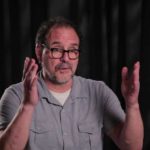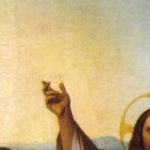We run our website the way we wished the whole internet worked: we provide high quality original content with no ads. We are funded solely by your direct support. Please consider supporting this project.
How do you respond to 1 Peter 1:1–2?
As I read it, I Pet 1:2 is the thematic statement for the whole chapter. As I will show in a moment, the rest of the chapter unpacks this statement, so the rest of the chapter should be used to interpret this statement. In the rest of the chapter we find that believers…
* have been given mercy through the resurrection of Jesus (vs 3)
* have received an inheritance that can never perish (vs. 4)
* are protected by the power of God until all is revealed (vs. 5)
* are refined by the suffering we undergo (vs. 6-7)
* and live in hope (8-9)
Then Peter says in vss. 10-12:
Concerning THIS SALVATION, the prophets, who spoke of the grace that was to come to you, searched intently and with the greatest care, trying to find out the time and circumstances to which the Spirit of Christ in them was pointing when he predicted the sufferings of Christ and the glories that would follow. It was revealed to them that they were not serving themselves but you, when they spoke of the things that have now been told you by those who have preached the Gospel to you by the Holy Spirit sent from heaven. Even angels long to look into these things.
It seems to me that all of this fleshes out the “foreknowledge” in the thematic verse. What was foreknown and partially revealed to the prophets was the plan of salvation that God was going to bring about and which Peter’s audience was now experiencing. In light of this, Peter says, we should live holy lives (vss. 13-9), fleshing out the sanctification theme in vs. 2. And he then returns to the foreknowledge theme when he says that Christ “was chosen (prognostico — same word as in vs. 2) before the creation of the world, but was revealed in these last times for your sake” (vs. 20). What God foreknew (because he predetermined it) was that Jesus would come and bring salvation, as Peter again reiterates in vss. 21-2).
So, in light of the whole passage, I don’t think Peter is saying God chose us INDIVIDUALLY according to his foreknowledge. What I think he’s rather saying is that God foreknew the plan of salvation centered in Jesus Christ, a plan that included the gracious invitation that whoever believes would be chosen as one of God’s people. What was left open was which individuals would accept this invitation. But now that we’re “in,” we can all say “we were chosen according to God’s foreknown and foreordained plan.”
Category: Q&A
Tags: Open Theism, Predestination, Q&A
Topics: Providence, Predestination and Free Will, Responding to Objections
Verse: 1 Peter 1
Related Reading

The Cosmic Dance Origin Story
In this video, Greg introduces The Cosmic Dance, by explaining what motivated him to write this quirky little book. If you live near the Twin Cities, come to the launch party Friday June 24th where you can purchase the book at a discounted rate. Click here for information on the launch party.

What Does a Perfect God Look Like?
The “classical view of God” refers to the view of God that has dominated Christian theology since the earliest Church fathers. According to this theology, God is completely “immutable.” This means that God’s being and experience never changes in any respect. God is therefore pure actuality (actus purus), having no potentiality whatsoever, for potentiality is…

Lord Willing? Part 3
In this final segment of Greg’s discussion with Jessica Kelley about her book Lord Willing?, Jessica talks about how to respond to someone who is grieving or in crisis. You can find part 1 here and part 2 here. We’re so grateful that Jessica took the time to share her story with us. We know…

Why Does God Need Prayer?
Greg Loves Questions. In his best selling book Letters from a Skeptic, he responds to questions from his father, who was then an atheist. Tomorrow Greg will be hosting a AMA (Ask Me Anything) on Reddit. We hope you can join us! Here is an adaptation of one of Greg’s responses to a question from…

A Calvinist and an Arminian walk into a bar…
Toby Bradbury via Compfight Roger Olson posted A Conversation between a Calvinist and an Arminian about God’s Sovereignty that we thought was dead on. In fact, we kind of wonder if Roger is bugging some of the conversations we’ve had. Déjà vu much? And since Roger has argued that Open Theism should be included under the broader umbrella of…

How do you respond to Jeremiah 1:5
The Lord says to Jeremiah, “Before I formed you in the womb I knew you, and before you were born I consecrated you; I appointed you a prophet to the nations.” This verse shows God’s love and plan for Jeremiah before he was born. This does not imply that Jeremiah could not have “rejected God’s…
